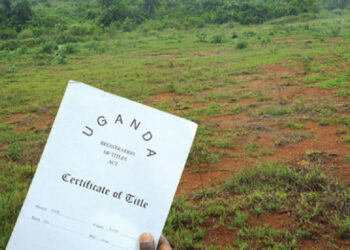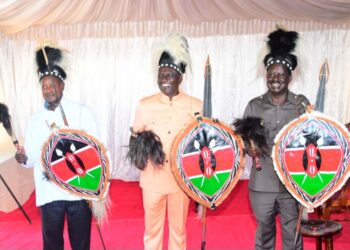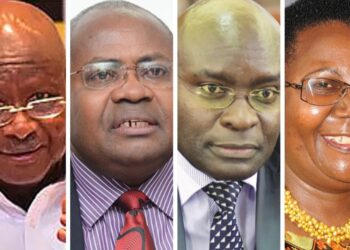By Mike Ssegawa
Louis Kasekende, Deputy Governor Bank of Uganda has been silent on matters of Crane Bank since the bank was closed more than year ago until his role in the sale of the bank was revealed recently by the governor himself in the opinion to New Vision.
The governor of Bank of Uganda Emmanuel Tumusiime Mutebile a couple of days ago wrote in New Vision defending the record of the bank. In the article however, he cleverly gave away the fact that it was not him involved in the sale of Crane Bank, instead, it was his deputy in charge at the time. Certainly one can say Mr Mutebile ably offset pressure and criticism, saying, the man you should blame is Kasekende!
Secondly, whereas Mutebile and Kasekende say their central bank is doing well, and their core defense is that they have kept inflation in check, a quick look at the prices of sugar, rice, bread, cement, fuel, etc will however give you a different picture. There has been more than 25% increment of prices on necessary commodities since 2016. May be the assessment given by the BoU bosses justifies the criticism that Ugandan bureaucrats “cook” figures when the reality on the ground is quite different.
So, Kasekende who managed the central bank when Mutebile took a sick leave for most of 2015, on Friday found an opportunity to defend his decision to close Crane Bank, despite having an audience whose ears were anticipating something befitting the occasion of celebrating two decades of capital markets, which actually had brought together the gathering.
The Deputy Governor however ignored the occasion to speak about how CMA and USE can grow the sector to more prominence. He however noted rightly, “it is proving very difficult to attract companies to issue securities on the USE.” The reason was however written in what he was about to say. Who invests where he risks losing his hard hardened money?
In Mr Kasekende’s 19 paragraph speech, only one touched capital markets. The rest of the speech, he was defending himself (BoU) from recent criticism that the central bank has been mismanaged especially, after disclosures following the sale of Crane bank in January 2017. Needless to say BoU could have saved Crane bank if they had not triggered a run on the bank following leaks that the bank was about to close.
Even then after the bank’s take over by BoU, bogus decisions and deal making characterised the process which has since left a foul smell.
This explains why Mr Kasekende would dedicate 9 paragraphs in a 19 paragraph speech, to defend himself, when clearly he admits, it is becoming difficult to invest in public listed companies.
Dr Kasekende “address (to) some of the criticism which has been made recently about the Bank of Uganda (BoU) in its role as bank regulator”should have been at a bankers’ dinner but he knows bankers know what is happening in the sector. Or to Crane Bank shareholders, but again he knows they will ask many uncomfortable questions including why the central bank denied them a right to give out loans six months before the bank became insolvent when clearly BoU knows how banks make their money.
Kasekende said this lie on Friday, “The successful resolution of Crane Bank in January of 2017 was the main reason for the improvement in financial soundness indicators of the banking system. I also want to point out that, despite the weakness of the economy in 2016 that I noted earlier, all of the commercial banks in Uganda, with the exception of Crane Bank, remained solvent and were able to comply fully with the statutory capital adequacy ratios. The only bank which suffered financial distress and became insolvent was Crane Bank.”
The deputy governor forgot that in its attempt to keep inflation under control and stop the shilling from further depreciation, the BoU raised rates aggressively in 2015 (when Kasekende was in charge), reaching a high of 17% in October 2015. This seriously impacted the economy. Many banks took a hit due to the fact that BoU killed the economy. Crane bank suffered more than others but others were not asked to write off capital counter to bou and international accounting practices.
However, you can hardly blame Mr Kasekende, reason being he does not answer if taking over of Crane Bank was required, and why as governor he allowed the situation of the bank to be leaked and exaggerated, triggering a run on the bank.
And when your business collapses in such circumstances, the deputy governor means to say, investors shall not be protected, instead, they will lose all their money and be made to pay even more than they invested. That is why Mr Kasekende hides behind the protection of Crane Bank depositors saying they didn’t lose their money and forgets he didn’t protect the share capital of more than sh350 billion invested by Crane Bank shareholders (investors) which is central to his job, to protect them too from loss. Never mind in its takeover, BoU forcefully wrote off sh600 billion so they create negative capital despite Crane bank having viable accounts.
Before security exchange investors, Mr Kasekende was emphatic, people who put their money into businesses don’t matter!
Kasekende’s half truths is part of the larger problem affecting the banking system in this country. In the takeover of Crane Bank, it has emerged there were more interested buyers other than DFCU, who were willing to offer better terms than DFCU which took a bank on “loan” of sh200 billion.
There is need for more explanation on why other interested buyers were not given indemnities just as DFCU was given that special priviledge!
That said, I am certain the audience that wanted to hear Mr Kasekende speak about reforms in capital markets and what BoU can do to help them prosper, might have been disappointed. And certainly, the Crane Bank topic to investor who had a loan there and later transferred to DFCU, was not amused. It was a wasted time, and Crane Bank issues are miles away from being resolved.
In conclusion, Kasekende should stop explaining away mistakes. Instead, as we struggle to make right what is causing the beating on the economy, honesty and transparency is key. He cannot explain why BoU hid the transaction of Crane Bank from key stakeholders including shareholders of the bank, or the depositors he purports to protect.
Therefore, the right thing to do is what Parliament director the auditor general to do; to carry out thorough forensic audit of BoU and any wrongdoing be addressed.
DFCU should also be investigated for why they bought assets at a lower price and immediately revalued them higher like it was revealed in their financial statements vis-à-vis their “deal” agreement with BoU.
Do you have a story in your community or an opinion to share with us: Email us at editorial@watchdoguganda.com











